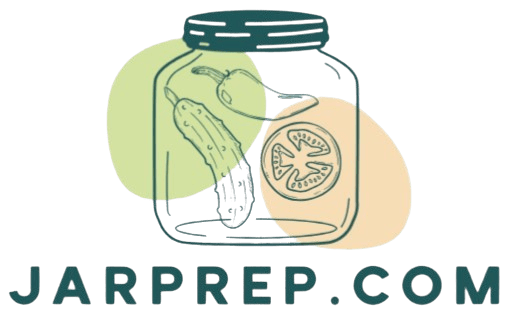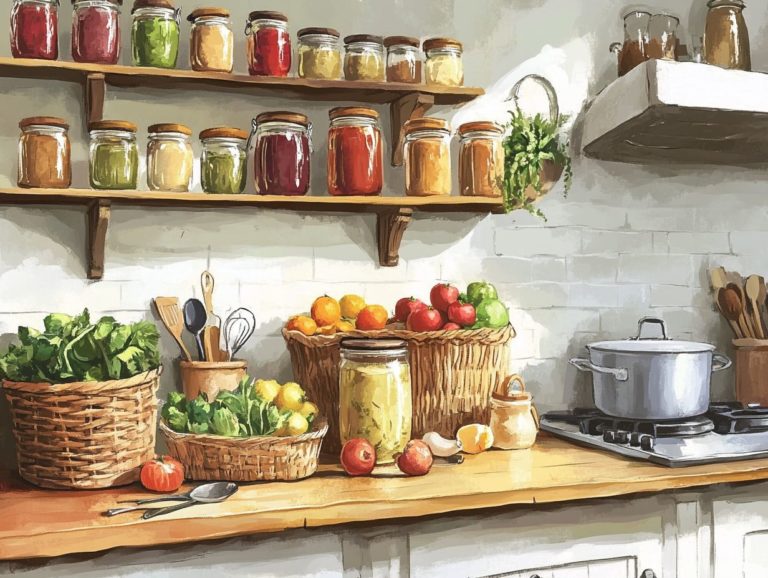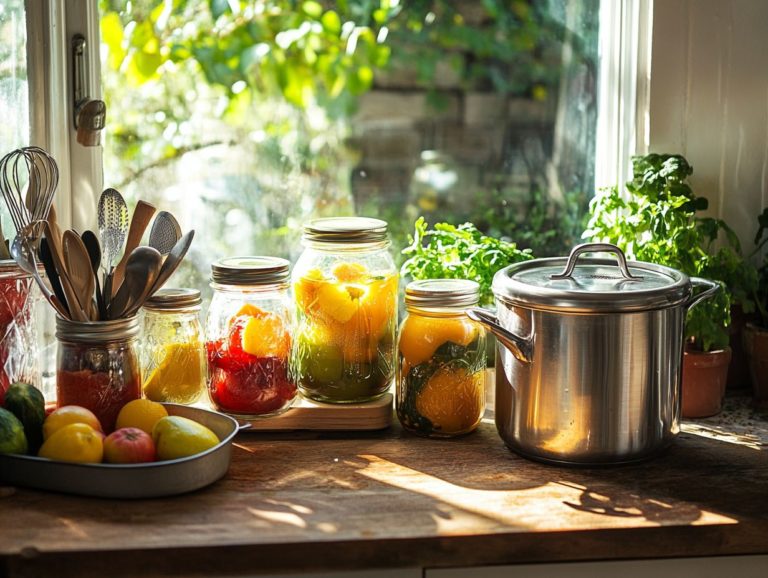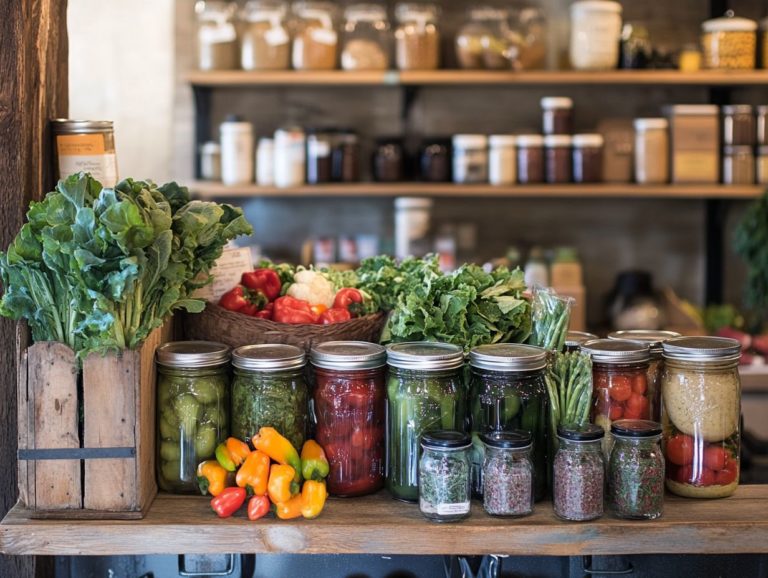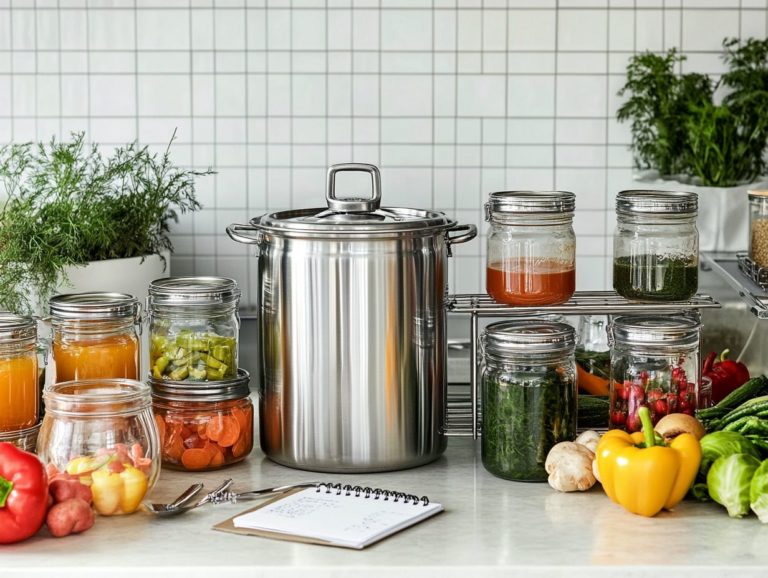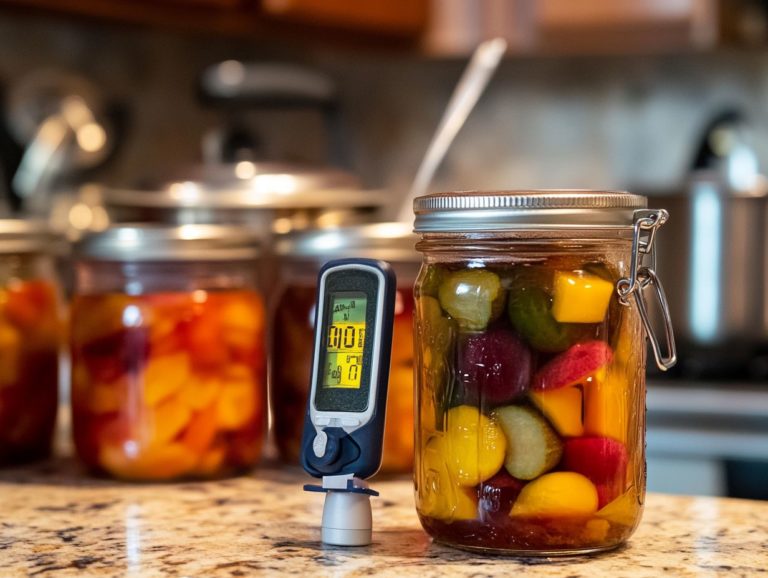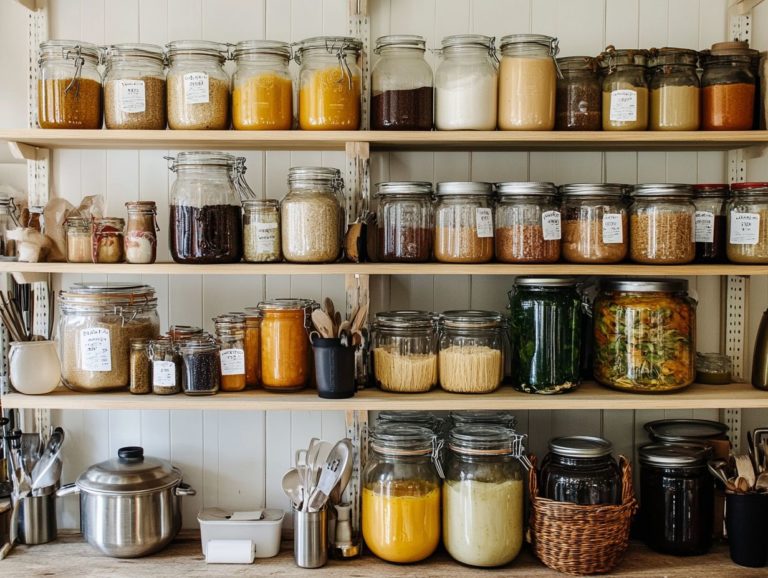Comparing Glass vs. Plastic Canning Containers
Canning is a time-honored method that allows you to enjoy seasonal flavors all year round while using various packaging options.
Choosing the right containers for canning can feel overwhelming, especially when comparing glass and plastic in terms of weight and durability. Each option has its own benefits and drawbacks, including cost, safety, and environmental impact.
This discussion will explore the benefits of glass canning containers, emphasizing their durability and heat-resistance, while also looking at the convenience and cost-effectiveness of plastic alternatives. Key considerations, like energy-efficient manufacturing and recycling options, will help you decide which type best fits your needs and values.
Contents
- Key Takeaways:
- Benefits of Glass Canning Containers
- Advantages of Plastic Canning Containers
- Factors to Consider When Choosing Between Glass and Plastic
- Frequently Asked Questions
- What are the main differences between glass and plastic canning containers?
- Which type of canning container is more environmentally friendly?
- Are glass or plastic canning containers better for long-term storage?
- Can plastic canning containers be safely used for hot water bath canning?
- Do glass or plastic canning containers affect the taste of food?
- Which type of canning container is more cost-effective?
Key Takeaways:
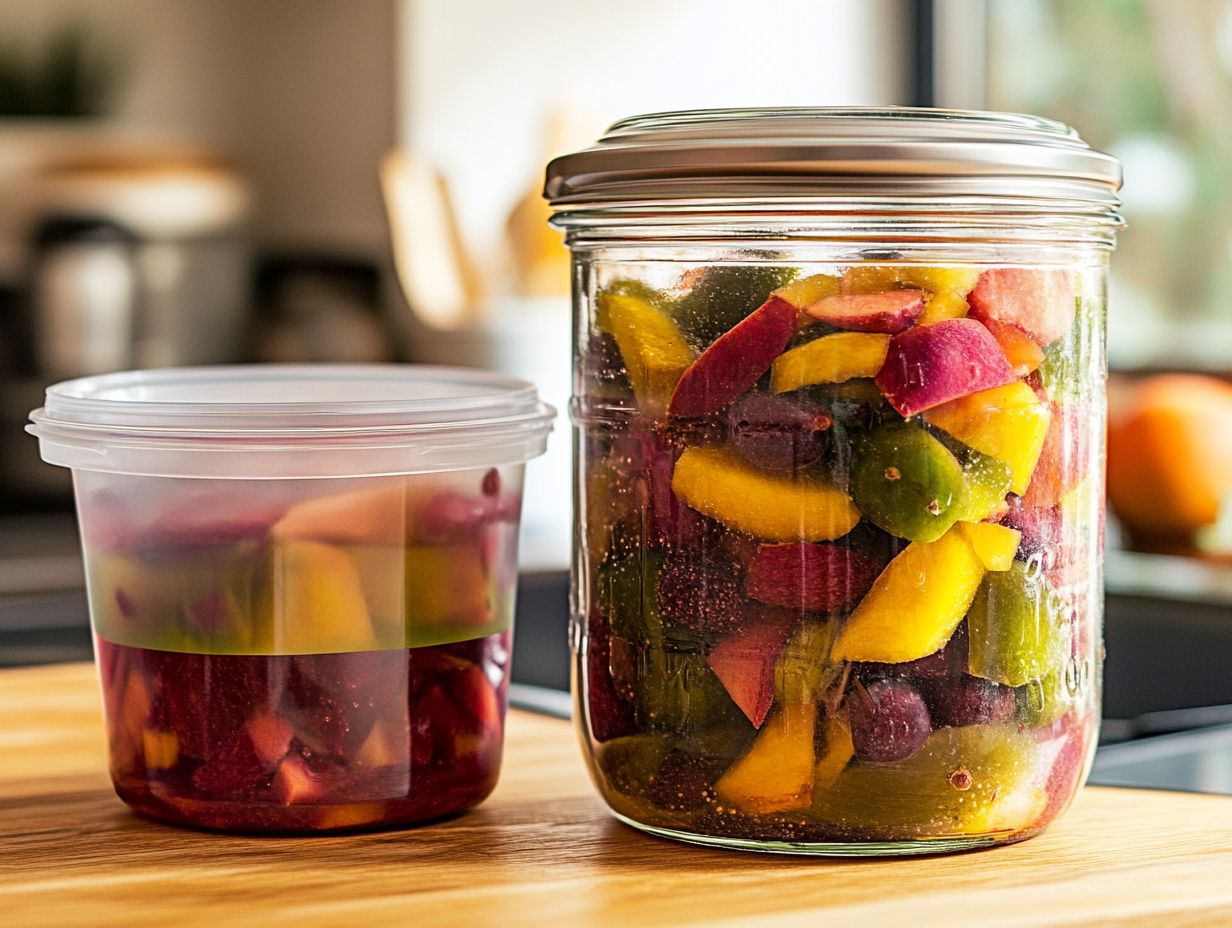
- Glass canning containers are more durable and reusable than plastic, making them a more eco-friendly option for food storage.
- Plastic canning containers are convenient and often cheaper, but they may not be as good for the environment as glass.
- When choosing between glass and plastic canning containers, think about your food preservation needs, personal preferences, and values to make the best choice.
What is Canning and Why is it Important?
Canning is an excellent method for preserving food in airtight containers, extending the shelf life of various items while maintaining their quality and safety. This process enhances the preservation of flavors and nutrients and meets the rising demand for eco-friendly food storage solutions today.
Through canning, you can enjoy seasonal produce year-round, reduce food waste, and stock up on healthy options in a cost-effective way. It supports the food industry by providing a reliable storage method, essential for households and businesses alike.
Canning dates back to the early 19th century when it was first developed as a military food preservation technique. It has now become a valued practice for home cooks and food enthusiasts. Using food-grade glass jars or safe plastic containers helps safeguard your culinary creations from contamination, ensuring the long-term viability of your preserved items.
The health benefits of canning are considerable; it encourages the use of homegrown produce and enhances your connection to food, leading to healthier eating habits by decreasing reliance on processed options.
As DIY canning grows in popularity, it’s crucial to be aware of safety practices especially regarding pressure canning and proper sealing techniques to ensure safe eating.
Benefits of Glass Canning Containers
Glass canning containers are known for their durability and reusability, making them a top choice for food preservation among health-conscious individuals and eco-friendly enthusiasts.
Unlike plastic, which may leach harmful chemicals like BPA (a chemical found in some plastics that can be harmful), glass containers keep your food safe and free from toxic substances. The glass jars also look nice, enhancing the presentation of your homemade preserves, and instilling pride and satisfaction in your canning efforts.
Durability and Reusability
The durability of glass canning containers makes them an exceptional choice for your food storage needs. These containers can withstand heat and resist scratches.
They last for years while maintaining their integrity, making them an environmentally friendly option. Unlike plastic alternatives, glass containers retain their quality and can be reused indefinitely, making them a sustainable option for those who care about the environment.
This remarkable resilience isn’t just for everyday use; it allows glass containers to endure high temperatures during the canning process without breaking down. Their scratch-proof surface helps prevent unsightly marks that can accumulate over time, keeping them looking pristine.
From an economic standpoint, investing in glass containers can lead to significant savings, as their longevity reduces the need for frequent replacements compared to plastic options.
By choosing glass over single-use plastics, you contribute to a healthier planet. Glass is fully recyclable and helps reduce landfill waste, aligning perfectly with modern eco-friendly practices.
Health and Environmental Considerations
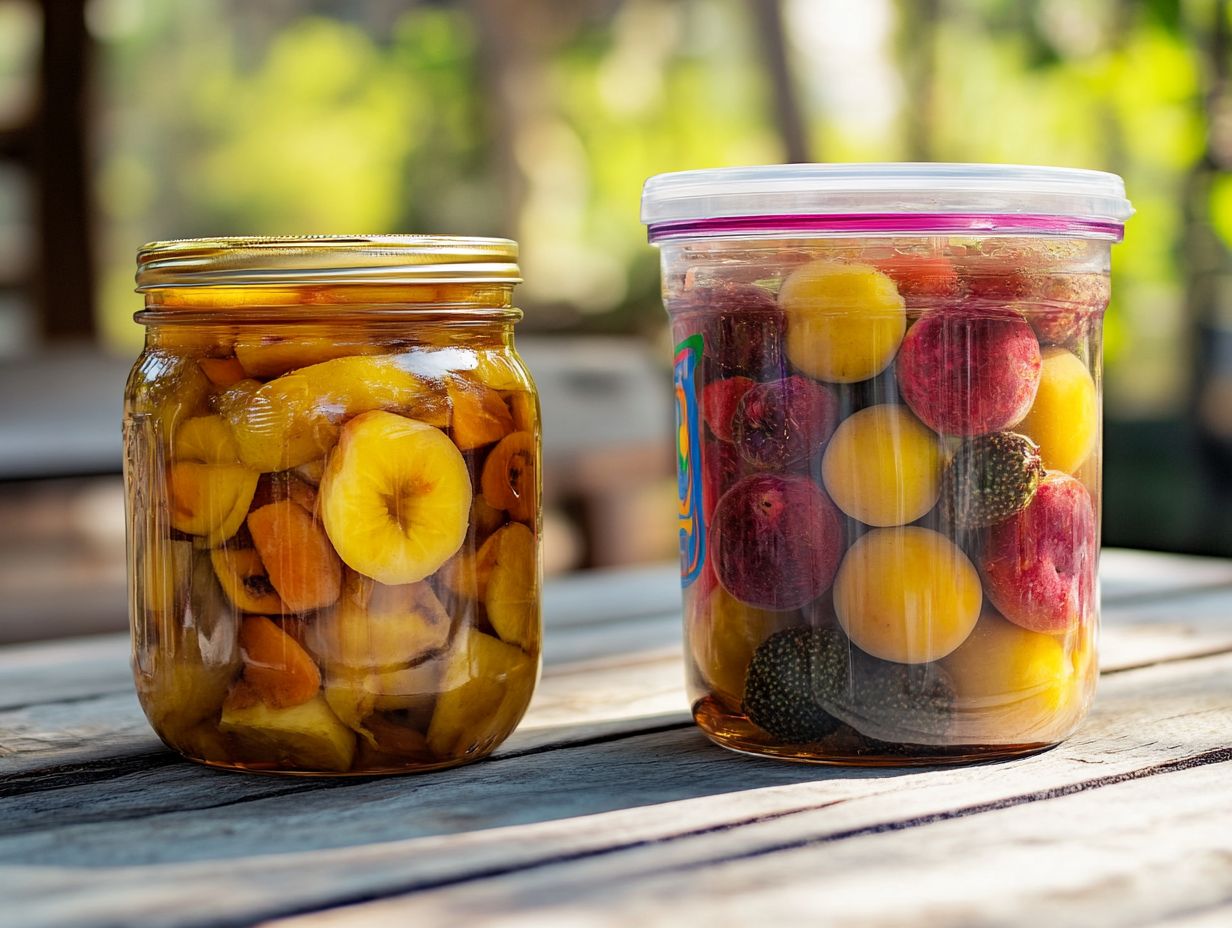
When you weigh health and environmental considerations, glass canning containers clearly stand out as a superior choice. Their non-toxic nature significantly reduces the risk of chemicals leaking into food compared to plastic options. By opting for glass, you steer clear of harmful substances like BPA, ensuring that your food retains its natural flavor while minimizing exposure to hazardous chemicals an essential step toward better overall health.
Choose glass for your health and the planet! It’s a smart move that benefits you and our environment. The infinite recyclability of glass aligns seamlessly with sustainability efforts, making it an eco-friendly alternative.
The durability of glass means you can use them multiple times without any drop in quality, unlike plastic, which tends to break down and release microplastics tiny pieces of plastic that can harm the environment into the environment.
By selecting glass containers, you actively contribute to reducing reliance on single-use plastics, which are infamous for polluting our oceans and harming wildlife, promoting healthier ecosystem practices. Embracing glass canning containers means you re becoming part of a broader movement toward a sustainable and healthier lifestyle.
Advantages of Plastic Canning Containers
Plastic canning containers present a host of advantages, especially when it comes to convenience and cost-effectiveness, making them a wise choice for today s busy consumers.
Their lightweight design ensures effortless handling and transportation, particularly when dealing with large batches of preserved food. Coupled with their affordability, these containers give you the power to expand your food storage capabilities without straining your budget.
Such features are invaluable for families eager to stock up on seasonal produce or for those who regularly immerse themselves in canning endeavors.
Convenience and Cost
The affordability of plastic canning containers makes them an appealing choice for you, offering budget-friendly food storage solutions that don t skimp on functionality.
Their convenience goes beyond just the price; these lightweight containers are a breeze to transport, stack, and store, making them perfect for canning enthusiasts who value efficiency and ease during the canning process.
Their airtight seals act as a formidable barrier against moisture and contaminants, ensuring your preserved foods stay fresh for longer. This practicality is especially beneficial if you regularly prepare large batches of meals or preserve seasonal produce.
Moreover, the transparent design of many plastic containers allows you to quickly identify their contents, enhancing organization in your pantry or refrigerator. Many of these containers are even dishwasher-safe, making cleanup a cinch and adding to their overall appeal.
With such a remarkable combination of affordability and functionality, it s no surprise that plastic canning containers, including brands like Nature Nate s and Snapple, have become a staple in countless households.
Switch to glass canning containers today for a healthier lifestyle! Make the switch to glass today and join the movement for a cleaner planet!
Storage and Transportation
Experience the convenience of plastic canning containers! Plastic canning containers truly shine when it comes to storage and transportation, thanks to their lightweight design that makes them a breeze to handle. They’re perfect for preserving large quantities of food. Their versatile nature allows for convenient stacking and organization, making them ideal for food storage. Whether you’re storing items in the pantry or fridge, or transporting them to an event, your canned goods will remain easily accessible and neatly arranged.
Not only do these containers maximize storage space, but they also simplify the process of moving items. You ll appreciate how effortlessly you can arrange multiple containers in various spots, like cupboards or vehicles, without worrying about the fragility that often comes with glass jars.
Their ergonomic design further enhances your experience, allowing for quick access during meal prep or unexpected situations. Many of these containers feature airtight seals that keep contents fresh. This makes them an attractive choice for meal planning and food preservation enthusiasts alike.
Factors to Consider When Choosing Between Glass and Plastic
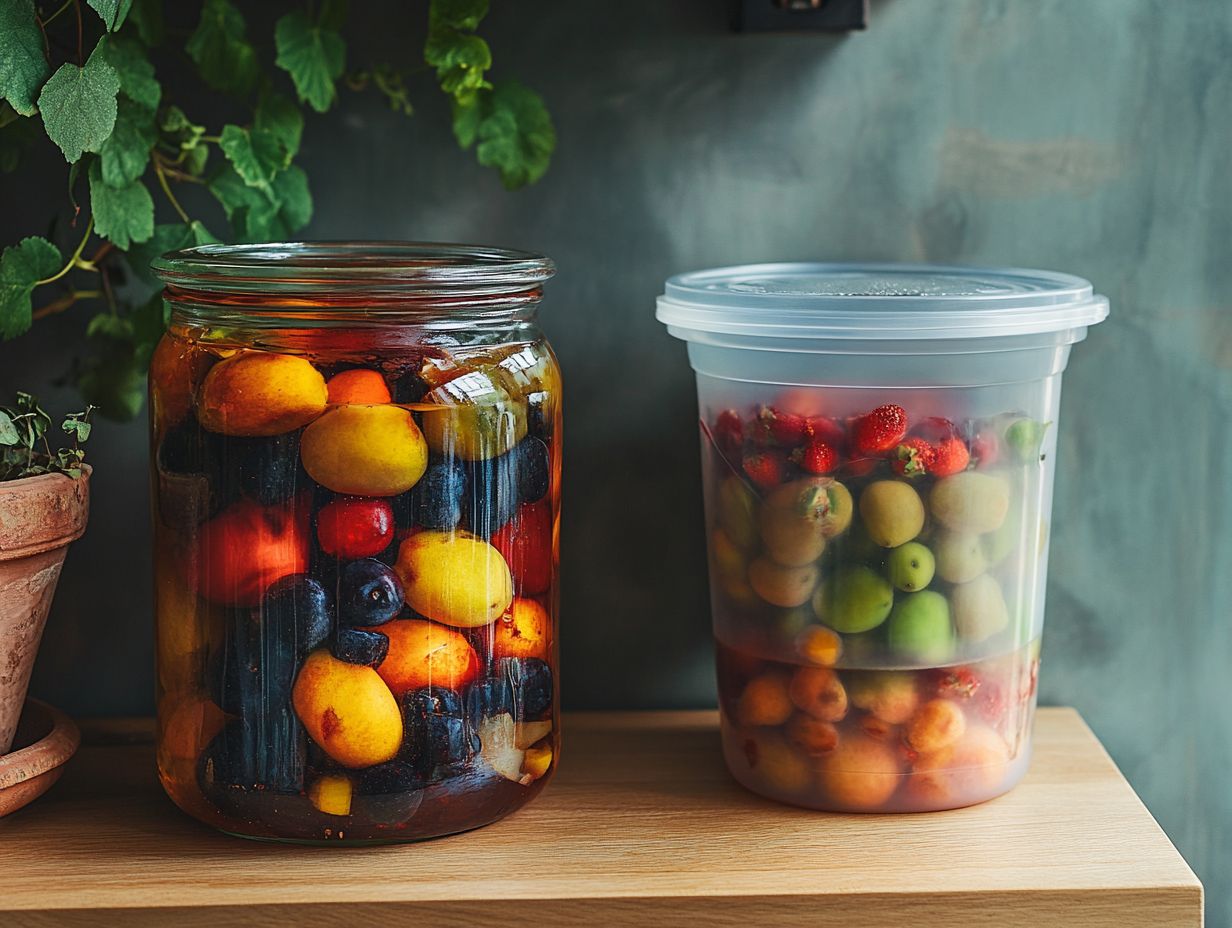
When choosing between glass and plastic for food storage, several important factors come into play, including your specific performance needs, safety considerations, and personal preferences.
Each material presents its unique advantages and disadvantages. Understanding these nuances gives you the power to make informed choices that resonate with your values whether you prioritize health, convenience, cost, or environmental impact.
Food Preservation Needs
Understanding your food preservation needs is essential when choosing between glass and plastic containers. Each material brings its own unique performance qualities that directly influence the longevity and safety of your preserved foods.
For instance, glass containers are often preferred for their heat-resistant properties and their ability to maintain food quality. Meanwhile, plastic options offer the flexibility and lightweight convenience that many find appealing.
When assessing the right choice, consider how each material aligns with your personal preferences and storage goals. Glass containers prevent harmful substances from seeping into food, allowing you to easily monitor contents at a glance. On the flip side, the lightweight and shatter-resistant nature of plastic makes it an attractive option for those with a busy lifestyle.
Ultimately, grasping your individual storage habits and understanding how these materials perform in real-life scenarios can lead to more informed decisions. This ensures that your foods stay fresh and safe for consumption, significantly enhancing your overall meal quality.
Personal Preferences and Values
Your personal preferences and values significantly shape your decision-making process when choosing between glass and plastic canning containers. You might prioritize health, environmental impact, or convenience, depending on your lifestyle.
For instance, you may lean toward glass for its non-toxic properties and sophisticated look. On the other hand, plastic might catch your eye due to its practicality and cost-effectiveness.
With the increasing awareness of sustainable practices, many people are scrutinizing the environmental impact of their choices. The recyclability of glass versus the pollution potential of plastic often weighs heavily on eco-conscious shoppers.
Food safety and preservation can also influence your decision. Glass containers don’t leach harmful chemicals into food, making them a preferred choice for those who prioritize health.
However, the durability and lightweight nature of plastic products may appeal to you if practicality is your primary concern. This creates a complex landscape of consumer behavior, shaped by a variety of personal beliefs and circumstances.
Frequently Asked Questions
What are the main differences between glass and plastic canning containers?
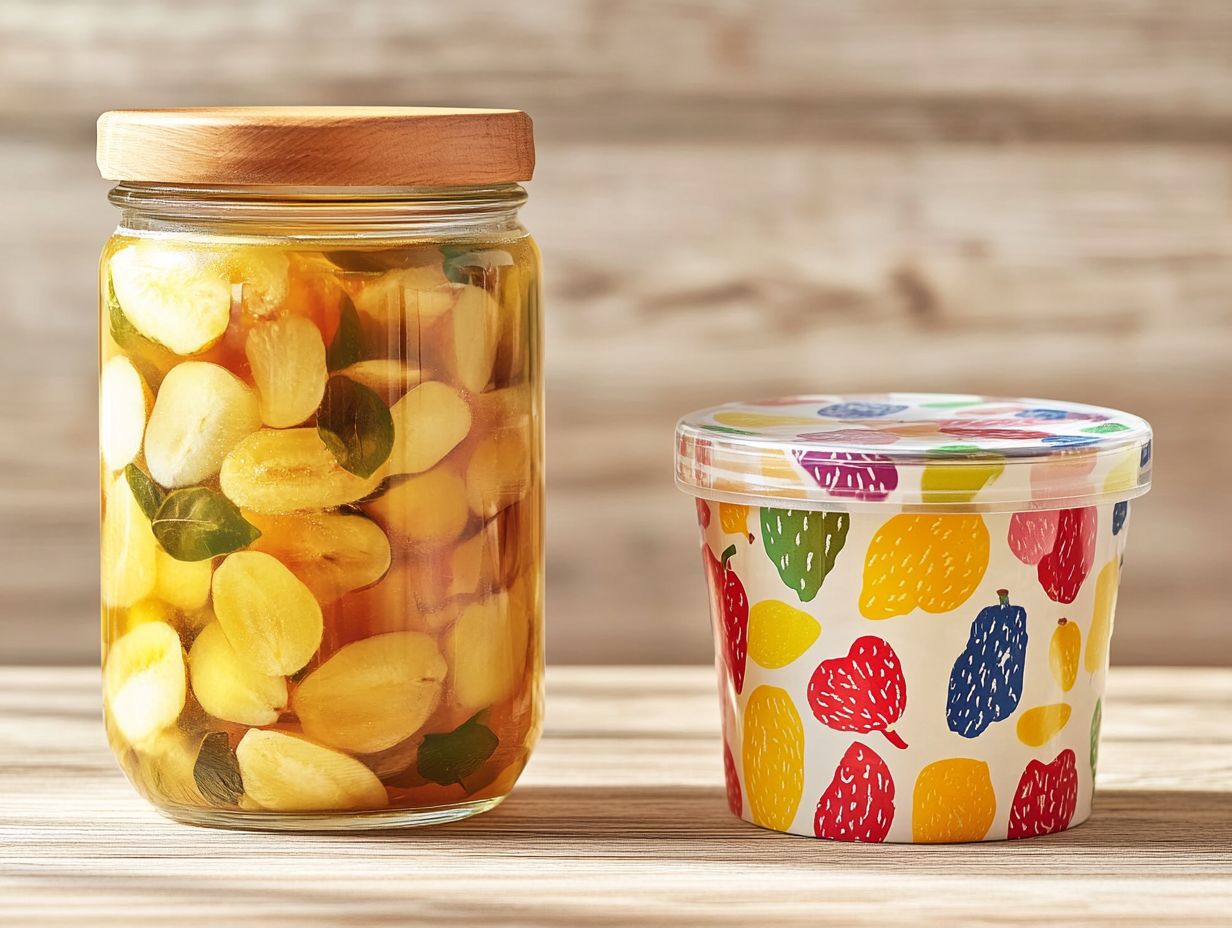
Glass canning containers are durable and heat-resistant. Plastic containers are lightweight and shatterproof.
Which type of canning container is more environmentally friendly?
Glass canning containers are a fantastic eco-friendly choice! They are reusable and recyclable, making them a great option for sustainable living.
Are glass or plastic canning containers better for long-term storage?
Glass containers are perfect for long-term storage! They keep your food fresh without absorbing smells or flavors. Unlike plastic, they won t release harmful chemicals into your food.
Can plastic canning containers be safely used for hot water bath canning?
Avoid using plastic containers for hot water bath canning. This method involves submerging jars in boiling water to seal them. Plastic containers may melt at high temperatures, leading to leaks.
Do glass or plastic canning containers affect the taste of food?
Glass containers have no impact on food taste. In contrast, plastic ones may impart an unwanted flavor, especially when heated.
Which type of canning container is more cost-effective?
Plastic containers are cheaper initially. However, glass containers save you money over time due to their reusability, making them a better investment.
